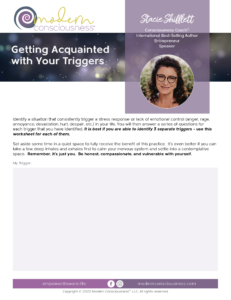In my last blog, I talked about how you take your physical body with you wherever you go. But, more importantly, you take all of YOU. You take your thoughts. Your emotions. Your beliefs. You take the experiences that have shaped your life. You take your knowledge and your opinions. You take your personality, preferences, inclinations, habits, moods, and reactions.
You take the BEST of YOU and the WORST of YOU.
Our Worldview
There are so many aspects within each of us and these aspects form the filter of our personal worldview. What is our worldview? It is our mindset, our ideologies, our personal value system, our beliefs and so on through which we filter everything. Every stimulus, every thought we have, passes through this filter and, no doubt, emerges from us like waves of light that refract into a rainbow of colors as they pass through a prism. We see a dog, for example, and that image is instantly transformed by our filters about dogs. We may love dogs and ooh and ahh with glee as what our filter refracts is interpreted as cute, fluffy, love dogs, pet the dog, I want a dog and so on. Or we may have a fear of dogs and our filters remind us that we were once attacked by a dog, that they are monsters, can’t be trusted, are a serious threat and I must frantically scramble to safety. This is how our personal model of the world works and that is what we take with us wherever we go.
What Triggers a Stress Response for You?
Why is it important to understand our triggers? If you are frequently thrown “off balance,” react in situations (before thinking and sometimes regret it later), or your moods fluctuate, it’s likely a response to something that triggers you. Triggers can become so ingrained in us, that we aren’t even aware that they exist yet they can impact our daily lives, and the lives of those around us, in a negative way. As with anything, if we aren’t aware of it, we can’t do anything about it! Therefore, developing an understanding of situations or reactions that frequently disrupt our lives and our joy is a worthy exercise! And, just to mention, triggers aren’t “bad.” They guide us toward areas in our lives that may need attention, so knowing your emotional triggers and creating strategies to ease them and promote emotional regulation is a key component of emotional health.
Exercise: Getting Acquainted with Your Triggers
To begin, identify three situations that consistently trigger a stress response or a negative emotion in your life. These can range, for example, from angry outbursts directed at others or situations that invoke strong negative emotions such as helplessness or feeling unwanted or unneeded. You will then answer a series of questions for each trigger that you have identified.
 I recommend answering the following questions in two ways.
I recommend answering the following questions in two ways.
First, to engage your subconscious, write down the first three things that pop into your head in response to the questions. Don’t think about it. Just write it down even if it sounds silly. Doing it this way engages your subconscious to provide the answers and our subconscious provides many clues to guide us on our journeys. Then I suggest doing it a second time contemplating your answers. Really give it some thought to see if you can identify some patterns in your life.
Set aside some time in a quiet space to fully receive the benefit of this practice. It’s even better if you can take a few deep inhales and exhales first to calm your nervous system and settle into a contemplative space. Remember, it’s just you. Be honest, compassionate, and vulnerable with yourself.
Triggers Worksheet
Here we go…
For each situation, write down the answers to these questions:
(Download and print my Triggers Worksheet)
- What is happening in this situation?
- What are the strongest emotions you feel when this occurs?
- What are your most prominent thoughts when this happens?
- Who do you criticize during these events?
- What is that criticism?
- Can you identify a particular ‘thing’ or ‘things’ within the situation that triggered you? The one that tipped you into a strong emotion?
- How often does this occur?
- Does a memory come to mind when this happens?
- If there are others involved, what were they doing when this happened?
- What were you doing?
- What do others contribute to this situation?
- What do you contribute to this situation?
- Do you gain any benefit from this? If so, what benefit? (e.g., the other person backs down and I get my way)
- Does this situation cause you to feel emotional pain? If so, can you name the hurt?
- Do these situations cause you to inflict emotional pain? And, if so, on who? Is that something you want to do?
- If you could, what would you change about these situations?
- What would you change about others involved?
- What would you change about yourself?
- If there are others involved, can you view the situation from their perspective? If so, what would they say?
- Do you feel that you are functioning as your best self at these times?
- How would your best self react or interact in these situations?
- What can you do in the future, with conscious thought and awareness, to change these situations?
The benefit of contemplating the answers to these questions can be enormous, especially if you really dig deep. Let me know how it goes or if you had any ‘aha’ moments by messaging me on Facebook or sending an email. I’d love to hear about your experience!
Subscribe to our newsletter for more tips, worksheets and helpful information.
Positively empowering you™,
Stacie






